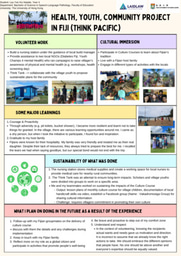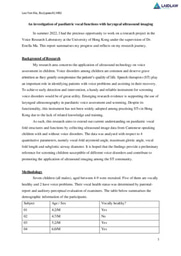LiA reflection (Week 5)
What went well?
As the build completes, we move into the second half of the project which comprises workshops from two local NGOs (Youth Champs for Mental Health and Diabetes Fiji) and the Think Tank.
Regarding the workshops, staff from Youth Champ 4 Mental Health carried out workshops for the village to introduce the topic of mental health. They talked about how to self-help and help someone with mental health issues as well as available resources. Quite a number of villagers, both males and females, attended the workshops. The activities were well received by them. I recalled in a photo description activity, a villager shared her thoughts on how mental health issues are dealt with in Fiji.
The work of Diabetes focuses on another dimension: physical health. Villagers and us started discussion on common communicable and noncommunicable diseases in the village. The health screening day was quite successful. Different health stations were set up, including eye and ear check, breast cancer screening, foot wash, dental care etc. These services, which the villagers had limited access to, were much needed in the rural area.
As for the Think Tank, we were required to come up with strategies to make the current project sustainable. I and another scholar, together with some villagers, worked on the topic "Culture Course". In our suggestion, our group proposed three initiatives. First, we made a 4 month plan with the villagers on how to continue teaching local culture to the village's younger generations. Second, we attempt to document some Fijian handicraft skills such as the making of Qato (bracelet), Sasa (broom) and Iri (fan) using video and short texts. We created a Facebook group for the villagers to exchange cultural information and to share the cultural videos that we made. Finally, we learnt that the villagers would like to set up their handicraft mini-market along the roadside and we tried to look for related information online. Yet, for the last initiative, we hadn’t derived any action plans ysince we did not have adequate information on the government’s policy and regulation on roadside mini-market.
What could have been done differently?
Since both of the workshops are information-loaded, visuals and handouts could be used to help participants better understand the content. In group discussion, subtopics (e.g. cause, preventive measures) can be given to facilitate organization of ideas.
For the Think Tank, I should remind myself to be culturally sensitive and think from the perspective of the villagers such that the benefits to the villagers can be maximized. The principles of design thinking could be useful to guide my problem solving process. For instance, I should have started off with a chat or interview with the villagers to learn about their views on their own culture. Things that could have been discussed include "How important is Fijian culture to you?", "How well do you think you know your own culture?", "What are some challenges you faced when learning/promoting your culture?" etc.
What did I learn about myself when working with others?
One of the challenging parts for me is the Think Tank. I found myself lacking ideas and the suggestions that I thought of were very limited. I need to broaden my horizon and learn about how different people manage similar issues.
What did I learn about leadership?
Before proposing any initiatives, a leader should start by learning about the actual wants and needs of the service recipient. It is incorrect to assume that we already know the right actions to take based on our own knowledge and judgment. In fact, talking to the villagers was really inspiring. Their sharing gave us a direction on how to proceed.
A leader should be able to promote a good collaborative relationship among the team. He/she should also enable each team member to contribute to the team. Oftentimes, teammates may come from different cultural, social and educational backgrounds, but each person has his/her own expertise which should be equally valued by the team.
What do I want to develop or focus on next?
The presentations of other groups impressed me. I want to develop my ability to critically analyze and reflect on a problem. I also want to be able to come up with creative and comprehensive action plans.


Please sign in
If you are a registered user on Laidlaw Scholars Network, please sign in